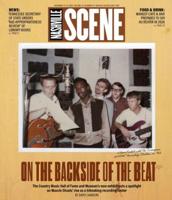
Rhiana Anthony and D.J. Hudson celebrate the passage of community oversight charter amendment, November 2018
Of all of the results from the Nov. 6 elections, the referendum to amend the Metro Charter and install a community oversight board for the police department was the most surprising. Not because it won, but because of the manner in which it won.
When the final votes were counted, Amendment 1 won by almost 20 percent, racking up victorious margins in 29 of the city’s 35 council districts. It was nearly a 2-to-1 winner in the polling places you might expect — Cathedral of Praise in North Nashville, Antioch High in South Nashville and Cora Howe School in East Nashville — but the measure was surprisingly strong elsewhere. At one of the biggest boxes in the city, Glencliff High in the Woodbine area, the yes votes outnumbered no votes 1,705 to 1,154. In fact, outside of some places that have their own police forces (like Belle Meade and Goodlettsville) and some Republican-leaning areas (like Bellevue and Joelton), Amendment 1 won handily around the city.
This was in spite of one of the most disingenuous campaigns in Nashville history working against it.
The Fraternal Order of Police formed a committee called “Vote No on the $10 Million Tax Hike” to convince voters to vote against the measure. The crux of the campaign was half-a-million dollars’ worth of ads that claimed the city would hike taxes to pay for the new commission. The problem? The budget for the new board is no bigger than a rounding error within a $2 billion Metro budget, and there are no taxes proposed.
Maybe this is what happens when the geniuses at the Davidson County Republican Party are running your effort. Not only was it based around the only scare tactic they understand — a tax increase, in this case a fictional one — but the campaign was so incompetent that it misfiled finance disclosures with both the state and Metro. The filing to Davidson County was comically awful, with DCRP chair Melissa Smithson signing and dating her witness statement two days before it was signed, dated and submitted by the group’s treasurer. The state form for the Friends of Police PAC, the entity they passed some of the money through, had different contributions and expenditures and had to file an amended version days later to clean up the mess.
Hundreds of thousands of dollars were funneled through the Andrew Jackson Lodge of the Fraternal Order of Police to fund this campaign. Whether the money came from local cops or the national FOP, which fights oversight efforts all over the country, we won’t know anytime soon. But complaints have been filed at the state and local levels over how all of this was handled.
The Community Oversight Now forces, meanwhile, spent less than $20,000.
The FOP is still fighting the results, claiming in a Tennessee Court of Appeals filing that the amendment never should have appeared on the ballot. Oversight Now lawyer Daniel Horwitz calls the effort “an attempt to invalidate a free election and strip 134,135 people of their vote.” He’s not wrong.
The optics of this are bad for the police. First, by getting into bed with the DCRP, the police made this an unnecessarily partisan issue. Then by continuing a legal strategy — after the FOP’s James Smallwood said, “We recognize that the voters have spoken, and we respect the rule of law and the will of the people we serve” — the police appear to be talking out of both sides of their mouths. Why did they fight against Amendment 1 so hard? Well, it’s been a rough couple of years for the Metro Nashville Police Department.
Pressure on MNPD Chief Steve Anderson has been mounting in recent months. His name wasn’t on the ballot, but it’s fair to say this election was a referendum on police management.
Anderson ran his own investigation of the Jocques Clemmons shooting in 2017, even though the TBI had been called in by District Attorney Glenn Funk. He became an issue in the vice mayoral race this summer when Sheri Weiner — not exactly a liberal — called for his replacement. Anderson set off alarm bells in certain corridors of city government when grand jury members were taken through a shooting simulator at the same time Funk was weighing whether to indict Officer Andrew Delke for shooting Daniel Hambrick in the back this summer. To any outside observer, it certainly appears that the police were attempting to put a thumb on the scale. Funk must have been sufficiently worried, as he chose to get a bench warrant for Delke and wait for the new grand jury to be empaneled on Oct. 1.
Concurrent to all of this, Mayor David Briley is awaiting a report from the independent Policing Project on traffic stops and race in Nashville. He commissioned the report after a local group’s study of police data found that a disproportionate number of African-Americans were pulled over by Metro police.
Eight years is a very long time to be a police chief in a major city, and the edges are starting to fray on Anderson’s tenure — a tenure that, to be fair, has had some successes. But if another report comes back showing problems with policing after such a clear message from voters about oversight, Briley may have no choice but to find a new police chief.




